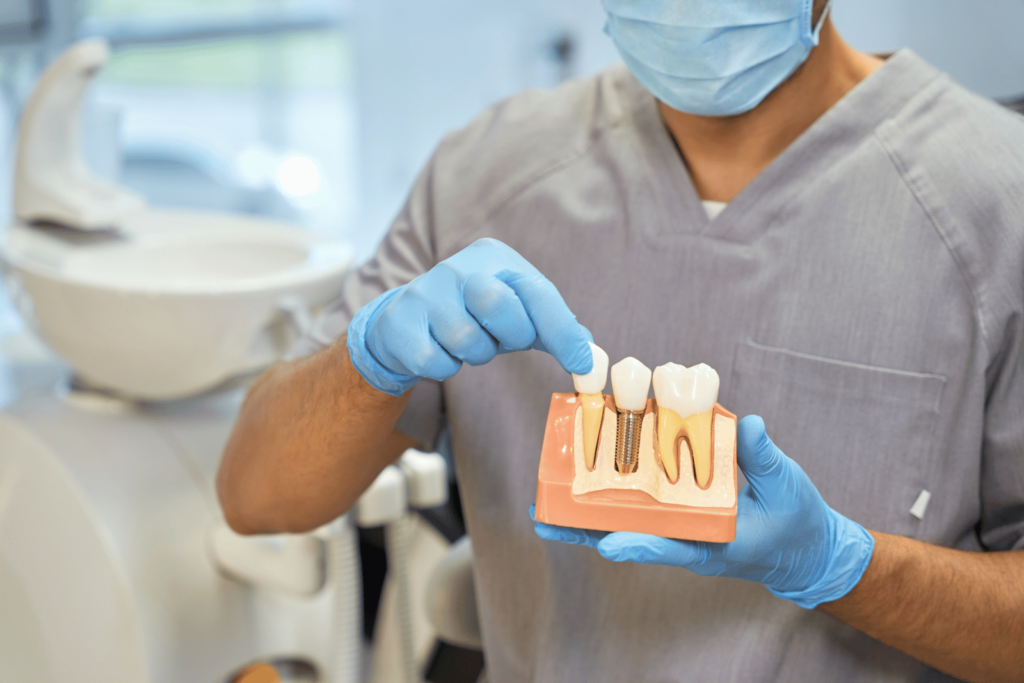Dental implant pain is typically mild to moderate and manageable with proper care, lasting only a few days to a week after the procedure when following appropriate pain management and prevention strategies. At Lansdowne Family Dental, we understand that while dental implants offer a revolutionary solution for replacing missing teeth with natural-looking, durable results, many patients have concerns about potential discomfort during and after the implant process.
Most dental implant pain can be effectively prevented and managed through:
- Proper pre-surgical preparation – Following pre-operative instructions
- Effective pain management protocols – Using prescribed medications as directed
- Post-operative care compliance – Maintaining proper oral hygiene and follow-up visits
- Understanding normal healing – Distinguishing between expected discomfort and complications
The key to minimizing dental implant discomfort lies in understanding what causes pain, recognizing normal versus concerning symptoms, and implementing proven prevention strategies. While some level of discomfort is normal during the healing process, severe or prolonged pain may indicate complications that require professional attention.
This comprehensive guide will explore the various sources of dental implant pain, provide detailed prevention strategies, and offer effective management techniques to ensure your implant experience is as comfortable and successful as possible.

Dental Implants Pain
Experiencing pain after getting dental implants is not uncommon, and it’s crucial to address any discomfort promptly to ensure proper healing and successful implant integration.
Causes of Pain After Dental Implant Procedure
Pain after a dental implant procedure can be attributed to several factors, including:
- Surgical Trauma: The implantation process involves minor surgery, which can result in post-operative pain and swelling around the implant site.
- Inflammation: Inflammation is a natural response to surgery. It can lead to localized pain, discomfort, and even redness.
- Nerve Irritation: Dental implant placement involves working in close proximity to nerves, which can sometimes lead to nerve irritation and subsequent pain.
- Gum Irritation: The gums may become irritated due to the presence of the implant, causing tenderness and discomfort.
- Sinus Issues: For upper jaw implants, the sinus cavity may be affected, leading to pressure and pain.
For patients in Ashburn, Leesburg, Sterling, and Lansdowne, VA, choose Lansdowne Family Dental for quality dental care. We offer various dental services with a patient-centric approach. Start your dental journey with us. Contact us!
Preventing Dental Implant Pain Problems
While some degree of discomfort is normal, there are steps that can be taken to minimize the risk of experiencing severe pain after a dental implant procedure:
- Choose a Skilled Implant Specialist: Opt for a qualified and experienced implant specialist who can minimize surgical trauma and potential complications.
- Follow Post-Operative Care Instructions: Adhering to the aftercare guidelines provided by your dentist can significantly reduce the risk of infection and excessive discomfort.
- Manage Swelling: Using ice packs and prescribed medications as directed can help manage swelling and associated pain.
- Maintain Oral Hygiene: Keeping the implant area clean is vital to prevent infections that can lead to pain.
- Avoid Exertion: Physical exertion can exacerbate post-operative pain. Resting adequately is essential for proper healing.
Managing Dental Implant Pain
In the event that you experience dental implant pains, there are effective strategies to manage the discomfort:
- Pain Medication: Over-the-counter pain relievers or prescribed medications can help alleviate pain and reduce inflammation.
- Saltwater Rinses: Rinsing with a warm saltwater solution can aid in soothing gum irritation and promoting healing.
- Soft Diet: Consuming soft foods reduces the strain on the implant area, minimizing discomfort during chewing.
- Topical Gels: Dentally-approved topical gels can provide temporary relief by numbing the affected area.
- Proper Rest: Allowing your body to rest enables faster healing and can reduce pain.
- Regular Follow-ups: Scheduled follow-up appointments with your dentist ensure proper healing progress and the timely identification of any issues.
Conclusion
Understanding the potential dental implant pains and how to manage them can make the journey of getting dental implants smoother and more comfortable. By following the preventive measures, adhering to post-operative care instructions, and promptly addressing any discomfort, individuals can enjoy the benefits of dental implants with minimal disruption. Remember, while some discomfort is expected, excessive or prolonged pain should always be addressed by a dental professional.
FAQs
Are dental implants painful?
While the procedure itself is usually performed under anesthesia, some discomfort can be expected during the recovery phase. This discomfort is manageable with appropriate pain medication and aftercare.
How long does the pain last after getting dental implants?
Minor discomfort and pain may persist for a few days to a week. However, severe or prolonged pain should be reported to your dentist.
Can I work or go to school after getting dental implants?
It’s advisable to take a day or two off from work or school to rest and recover after the procedure. Physical exertion can potentially worsen discomfort.
Are there any risks of nerve damage during implant placement?
While rare, nerve damage is a possibility during implant placement. A skilled dentist can minimize this risk through careful planning and precise execution.
What can I eat after getting dental implants?
A soft diet is recommended initially to prevent strain on the implant site. As healing progresses, you can gradually reintroduce firmer foods.
When should I seek professional help for implant pain?
If you experience severe or worsening pain, excessive swelling, or signs of infection, it’s important to contact your dentist promptly for professional assessment and guidance.






